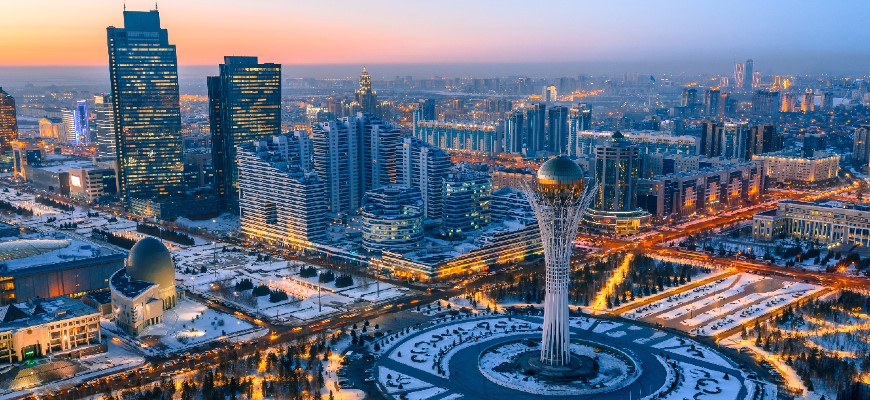Over the last week, events in Kazakhstan were portrayed across mainstream and social media with such variety that it was almost impossible to have an early accurate view. Whilst there is still much to learn about what unfolded and who is responsible, some details are beginning to emerge.
However, first we must point out that those of us who have an intimate knowledge of the country know that first and foremost Kazakhstan is a wonderful, hospitable and successful country which welcomes tourists, investors and foreign workers from all over the world, especially the West, and very much so, the UK.
A fascinating journey; from a Soviet Republic to a reliable western partner
Kazakhstan is a country which stands out in several ways, perhaps most significantly as one of the pivot points of the East and West, politically and geographically. In the 90’s, Zbigniew Brzeziński, a former US National Security Advisor, wrote that whoever wished to control the world needed first to control Central Asia. In its three decades since independence from the USSR, Kazakhstan has prevented external influences controlling the country and has achieved remarkable successes, politically, economically and strategically. It is the most pro-Western of the former Soviet republics, has a liberal economy and a highly educated and skilled population. It has carefully charted the travails of global and regional pressures with deft skill, especially with the decision to unilaterally disarm as a nuclear weapons state. Today, Kazakhstan sits as an independent nation with the normal regional alliances and memberships one sees the world over. It is the most successful economy of the post-Soviet states, a feat achieved partially through early collaboration with the United States under President Bush Sr in the Oil and Gas sector – which accounts now for about 60% of state revenue. Over the last five years a concerted effort has been made to further diversify Kazakhstan’s economy.
It is a matter of historic record that the leadership of President Nazarbayev has led this era of multi-faceted success. Nazarbayev voluntarily ceded power two years ago and it seems that until this crisis he retained much influence in the governance systems he had built and maintained. His tenure has however not been without criticism; he is attacked by those who accuse him of hoarding power and wealth. In June 2019 President Tokayev was elected, replacing the Nazarbayev as the Head of State. He has since faced immense pressures as Covid and falling energy prices hit the country.
Are the troubles here to stay?
Over this last week Kazakhstan was engulfed with a national crisis which threatened to destabilise the country; The government took decisive and uncompromisingly firm steps to address the immediate law and order challenges. The cabinet was quickly dismissed and the President has today announced a new cabinet which will focus on the genuine concerns that people have voiced on social media and in the streets. The protests which were the catalyst for much demanded reforms came from ordinary hard-working Kazakhs.
It was observed that all the protests were allowed to proceed with little to no interference from the State, until some among the peaceful protestors in Almaty turned violent with grenades, Molotov cocktails, live ammunition, bank robberies and looting. Almaty is Kazakhstan’s old capital, its biggest city and the main centre for economic activity.
We now know from first-hand witness accounts that the attacks appear to have been highly organised, coordinated, and targeted locations of strategic importance such as the TV station and broadcast antenna, the water supply and the airport air traffic control tower. Already there are numerous reports of scores of police and military dead, as well as more than 160 civilians. There has been looting of homes in affluent areas in Almaty with victims killed as they were being robbed. President Tokayev has called this crisis an attempted coup d’état abetted by terrorists and external elements. More information will likely come out in the days to come about these elements and their local masterminds. The majority of Kazakhs appear to support his decisive and tough response to what is undoubtedly the worst crisis to hit the country since independence.
Kazakhstan’s future; an opportunity for the West?
Throughout the country calm has now been restored and so the hard work must begin: how will the Kazakh government deal with this immediate aftermath and the many genuine concerns of the citizens? Amongst those are the political and economic reforms sought, the relationship between wealth and political power; and the deployment of the CSTO – Kazakhs welcome the support but are suspicious of a longer-term deployment. It would seem to me that the CSTO will see little benefit in staying long term, and it has just been announced that within a week their withdrawal will start.
The crisis in Kazakhstan cries out for Western support to the constitutional government, yet near silence has prevailed in the last week, a statement from the US Secretary of State neglected any mention of the security officers killed or the government buildings attacked. The Kazakh people deserve our support and working with the elected President in the reform agenda is one path likely to lead to a better future. Kazakhstan already benefits from much Western engagement in many spheres including governance, economic investment, education, healthcare, infrastructure and rule of law; Going forward western governments, international companies and institutions ought to continue to remain engaged in activities which benefit local, regional and global development and prosperity. For all of us from the West there is much we can do, and should we choose to do so, we have a vital role to play.
Afzal Amin is CEO of London Expertise Ltd, a UK based investment company specialising in infrastructure and exploration mining


